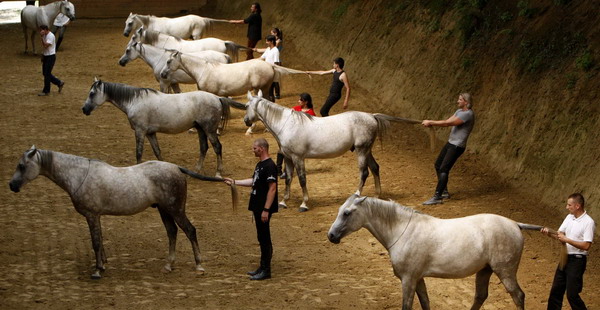Bridging the gap: A year of one's own
Updated: 2011-08-13 08:20
By Xu Lin (China Daily)
|
|||||||||||
BEIJING - Taking time off, checking things out for a year, slowing it down, doing some traveling and maybe some soul-searching.
Sometimes known as a "gap year", the practice of changing gears for a year - getting out of the educational grind and finding some peace of mind - has been popular for decades in the West and in countries like Japan and South Korea.
Now it's taking root in China.
"We just packed and started off, without any tour plan. It's really not that hard," said Xie Pinghang, 29, who traveled overseas for 10 months with his girlfriend.
They quit their jobs and spent about 40,000 yuan ($6,260) visiting 18 countries in Asia and Africa, such as Thailand, Myanmar and Egypt.
During their tour, Xie and his girlfriend Cai Ting, 30, lived in cheap hostels, rubbing shoulders with backpackers from all over the world, and even spent 40 nights in airports and trains, ate street food or cooked on their own.
"It's not mainly to save money, but to be integrated into the local life. I don't think I suffered any hardship. These are all sweet memories. Only once in Nepal, I wasn't feeling very well when we were traveling on foot," Cai said.
They also enjoyed a lot of free accommodation and food in Iran and Pakistan.
"The locals are so hospitable. Sometimes they would invite us to their houses, offer tea or fruit, buy us bus tickets, or give us a free ride," says Xie.
Cai was always the one who talked with the locals, as Xie's English is poor. But when Cai left for her MBA studies in New York last August, Xie had to use an electronic dictionary and body language to communicate.
Being forced to speak English certainly brushed up his skills.
"Everyone should practice a gap year, learning how to forget one's gains or losses. Nothing can deter me now," Cai says.
In recent years, more and more Chinese youngsters are joining the tide.
Tai Jing, 25, postponed her graduation from Suzhou University in June due to her gap year.
In spite of strong disagreement from her parents and teachers, she left school in 2007 as a sophomore and spent two years in Sichuan and Qinghai provinces, the Tibet autonomous region, India and Nepal, with about 10,000 yuan.
For about a year, she lived in different Tibetan Buddhist temples in China and practiced Buddhism. She got up and went to bed early, listened to preaching, sometimes planted vegetables and cooked.
"It was during my tour that I became interested in Tibetan Buddhism. I found tranquility and inner peace in temples," she said.
For another year, she led a secluded life in the remote Tibetan countryside. She lived in villagers' houses and helped them do housework and farm work, such as feeding pigs.
"I was born and raised in the city, but I love the simple life, going to bed with the lambs and rising with the larks to till the land, " she said.
She now works in a Taiwan-based Buddhist charity, Tzu Chi Foundation in Suzhou, and believes it's both natural and fulfilling to be devoted to philanthropy.
"I've found my meaning in life. One should do things that are beneficial to the world, environment and others. I have little desire for money and power," she said.
The popularity of gap years in China was triggered in 2009 by 30-year-old Sun Dong-chun's book The Late Gap Year. It recorded Sun's 13-month adventure as a backpacker and volunteer in NGOs in six countries, at the cost of 21,000 yuan.
"When I started my journey in December 2006, I found little Chinese information on the Internet about gap years," said Sun, who is believed to be the first to promote gap years in China. He met his Japanese wife while working at an NGO in Japan, moved to Japan in 2009 and now works in the government.
The book has inspired many young Chinese to follow their dream of world travel. Websites and forums about gap years have sprung up since.
"I never expected that so many Chinese would be interested in it," Sun said.
Hot Topics
Anti-Gay, Giant Panda, Subway, High Speed Train, Coal Mine, High Temperature, Rainstorm, Sino-US, Oil Spill, Zhu Min
Editor's Picks

|

|

|

|

|

|







